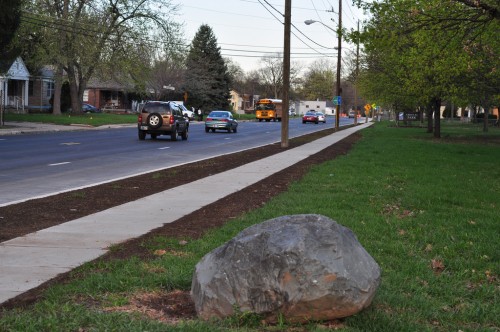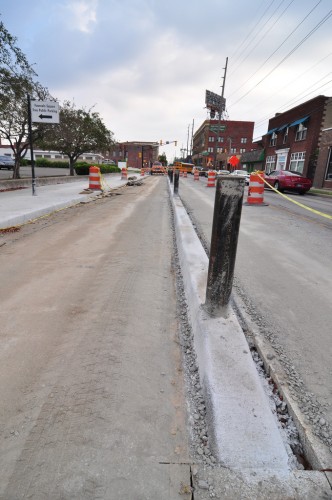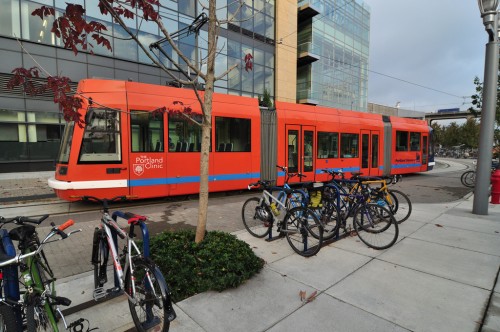
On July 13th, 2011, the Indiana Utility Regulatory Commission approved the lease of the water utility to Citizen’s Energy. While this has been debated vigorously over the past year and a half locally, what it means is that when it goes through, over $425 million will become available to put towards Rebuild Indy; a program that I have given praise to as well as been highly critical of.

The crux of why I have been critical, is that none of this money has thus far been diverted, at least in principal, to addressing our horrendous transit situation. Indeed, Indyconnect has done much to address this yet with no means of putting shovels in the ground, the receipt of this much money could provide an excellent opportunity for the city to step in and help fund some of the innitiatives. What the Rebuild Indy program HAS done for transit thus far has come in the form of new sidewalks along existing bus corridors as well as funding bicycling infrastructure which also appears in the Indyconnect plan. However, no real money put towards replacing aging IndyGo bus fleets, addressing the large expense of advance engineering & environmental studies for some of the BRT, rail and light rail routes hinted at in the Indyconnect plan. These tasks can be funded separate of the fact that funds for building and operating them have not been found yet and themselves are significant costs associated and required for their implementation. How about throwing some money IndyGo’s way for a real time GPS tracking system? This is in the works, but will not be funded until 2013 per current plans. Additionally, funding a study of the belt railroad relocation could be a good use of the funds. Furthermore, there are a lot of streetcar systems being planned or are under construction in many of Indianapolis’ peer cities.

Would taxpayers find the use of Rebuild Indy funds put towards projects like this a good use of the money? While not as glamorous in appearance as say a newly paved road or a greenfield sidewalk, this funding could go a long way to making Indyconnect a real possibility or to funding a downtown streetcar circulator route. Even though I have laid out a number of suggestions, there are plenty of other mass transit related items that are just as worthy of expense as another road being repaved.
If you agree with any of this, I encourage you to not waste any time and click on the link on the right hand side of Urban Indy. Contact your City Council representative and voice your opinion. Devoid of any real portal for communicating this to the city, your representative is the best pipeline to providing input on this subject.
how about banking some of the money and working from the interest to create pedestrian scale projects. This means that even in down years, we could go forward with projects like the cycle track or extensions to the cultural trail. We could even set aside half of it and gain interest to go towards the transit portion of a city leaving some for operating costs. Everyone always wants to spend money immediately. Let’s use this money to invest in a future.
Although I am a huge advocate of a streetcar network for our city, I think the best use of any funds would be to offer GPS tracking for IndyGo. This is critical for choice riders that don’t want to wait at a bus stop and it is much cheaper than increasing frequency of service. I used the GPS bus-tracking app that Chicago has for their bus system, and I will never wait for another bus again. This will allow people to gain value from the existing bus service, without the need to offer shorter wait times.
Having a real time GPS app would be nice. They do not lack the capbility to share the data today. It is a matter of network security as I understand it. It takes a while on their slim margins to get something like this into service. Perhaps paying for this now, can free up the money later for something else.
This is a one-timer. We will receive proceeds from a sale of an asset, and it seems that mayor is set on spending it on infrastructure, which is better than spending it on operating expenses. However, a lot of things can be considered infrastructure, and not all infrastructure is created equal…repaving a road is probably by most considered an investment in infrastructure, but to me it should be called an operating expense. We built a road, and the upkeep should be supported by users/taxpayers. So, my stand on this is that we should slow down with spending it and be more transparent. My first option for spending the proceeds from the sale of a water utility would be on needed sewer/water infrastructure.
There are no actual proceeds from the sale; it is just more debt for the ratepayers. This deal has indebted water ratepayers for 30 years to pay back bonds out of so-called “user fees” to repave cowpaths, while not making a real dent in the fundamental infrastructure problems in Indy.
We agree here. This is why I have spent a lot of keystrokes complaining about what has been mostly RePave Indy and not rebuild. Trying to fundamentally change wide streets. Lack of sidewalks, etc.
.
Addressing mass transit would be, in my opinion, fixing one of the “fundamental infrastructure problems” as you put it.
Totally agree. Rebuild Indy needs to be about fundamentally changing (improving!!!) the way we move around the city, not just putting a band-aid over the system already in place.
The street network should be sustainable on its own from other funding sources. If it isn’t (and it isn’t) then other changes need to be made outside of the funds for this Rebuild Indy project to help make that possible.
It’s probably not reasonable to expect 100% of the funds to go to changing public transit, improving bikeways and sidewalks, but it is my perception that the dial needs to be turned in that direction.
If Kennedy was smart she’d pick up your Repave Indy and really hammer how it is different from Rebuild or Reinvent.
The stolen water deal and PILOT funds are a one-time slush fund for the mayor to spread his …. around the city. They can not address mass transit – first because there is no mass and therefore no need for mass transit. There is a need for focused, clean, timely and efficient transit, which generally means funding the operational, capital (including lane designations, signalization timers, etc. and maintenance needs of the existing system, while allowing it the flexibility to address the “real” needs of this city and not the “wants” of a few.
Second, there has to be dedicated funding, not slush funding for transit to be improved. But as long as corruption is pervasive throughout government, any increased funding will be wasted on random, expansive contracts, with no overall change in the city’s infrastructure health.
You are wrong about not addressing mass transit. They can be spent directly on engineering and environmental studies. Those are long term studies that need funding and do not depend on an ongoing revenue source. To get them built and operating it does, but it pays to do footwork ahead of time so that somewhere down the line when the federal govt is looking for “shovel ready” projects, well hey look Indy did their homework and have a bunch of proposed lines already past the EIS process. Additionally, the IndyGo GPS tracking is on the books. Getting it a couple years ahead of time isn’t going to require more operating funds.
.
freelunch, I dont know who you are behind the keyboard but you are far too bitter about life based upon your posts here and the skyscraper city board.
I think a significant chunk of the water money should go to paying for the stormwater (deep tunnel) project in cash so we don’t have to pay $60/month in sewer fees for the rest of our lives to retire hundreds of millions in bonds for that…and so we get the benefit of clean rivers sooner.
Chris,
I am not sure what you are talking about; there is no cash. The water deal is money borrowed against the future revenues from water user fees. The money they are spending now is from PILOT funds – future sewer fees. I agree it would be a better use of these borrowed funds since it would actually go to sewer improvements, but that is what we had before either of these deals were enacted. Our sewer / water bills will go to $60+ month without the water deal and PILOT fund theft. If the water deal theft funds are applied to tunnel project, our bills will still go to $60-month. With the water deal and PILOT deals being used to repave cowpaths (most arterial streets outside of the main commuting paths), and recreate sidewalk obstructions (there is no real inspection of any of these improvements – if no one complains about newly built infrastructure, it will remain that way – and you better go to the top of the food chain) the rates will be higher still, despite their lies about make-believe efficiencies.
Since the ink is not dry yet on the water deal, we will probably find out after the election sometime next year when we have to start paying back the water deal bonds.
How about putting all the money towards water/sewer infrastructure so we don’t have water rationing every summer, and raw sewage dumped into our streams on top of the projected tripling of water/sewer bills that will place the city much higher than comparable sized cities trying to attract new businesses/jobs and high income households.
The proper funding mechanisms for light rail and IndyGo is a gas tax, but our politicians are too dim or afraid to even suggest this logical/sustainable solution to promote mass transit.
I agree with Nick about a gas tax (also acknowledging that’s one safe way to end a political career in Indiana).
I would not use these funds for bunch of small projects / half solutions. It’s like winning a jack pot, and then spending it all right away without any planing and without any idea if you were creating a lasting benefit for our city.
NOTE TO KENNEDY: WHEN ELECTED MAYOR, PLEASE START REBUILDING INDY…NOT REPAVING INDY